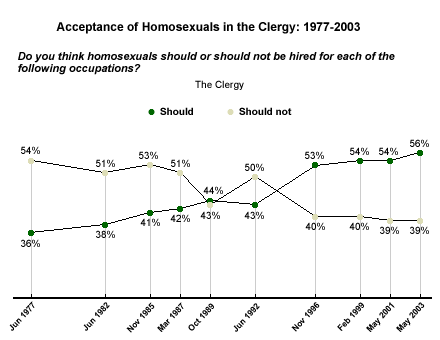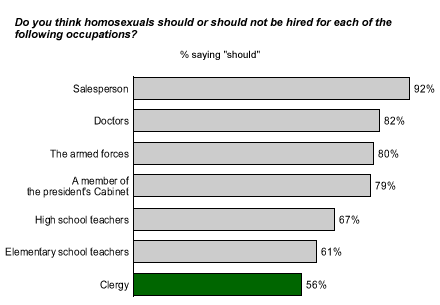At the General Convention of the Episcopal Church, which starts at the end of July, American Episcopal delegates and bishops will choose whether to ratify the Rev. V. Gene Robinson's election as bishop coadjutor of the Episcopal Diocese of New Hampshire. Although Robinson is clearly a well-respected priest, it's quite possible that they will decide against him.
"We're not opposed to Reverend Robinson personally," said Bruce Mason, media officer for the American Anglican Council, a network of conservative, orthodox laity, priests, and bishops. "Our problem is that he's openly gay."
Many Americans -- though less than a majority -- share this point of view. And it's a viewpoint that's losing some momentum, though not quickly.
Glacial Movement
In May 2003*, Gallup asked Americans whether homosexuals should be hired for a variety of occupations, including the clergy. Fifty-six percent said they should, 39% said they shouldn't. Only recently have a majority of Americans begun to support this position. As recently as 1992, the numbers were nearly reversed.

In 1977, the first time Gallup asked if homosexuals should be hired into the clergy, 36% said they should and 54% disagreed. From there, acceptance of gay religious leaders began a long, slow climb. In 1982, 38% said homosexuals should be hired, a percentage that grew to 41% in 1985, 42% in 1987, and 44% in 1989. It wasn't until 1996 that a majority of Americans -- 53% -- said homosexuals should be hired for the clergy.
Hiring Homosexuals
Homosexual religious leaders have found increasing acceptance among the American public, if not the American Anglican Council. But compared to that of other occupational positions, acceptance of homosexual clergy is at the bottom of the list of the professions tested. More Americans think homosexuals should be hired as salespeople (92%), doctors (82%), members of the armed forces (80%), members of the president's Cabinet (79%), high school teachers (67%), and elementary school teachers (61%), than members of the clergy.

Furthermore, acceptance of homosexuals in the clergy is also growing at a much slower rate than for any of the other occupations. The number of Americans saying homosexuals should be hired as elementary school teachers has grown by 34 percentage points since 1977 (when it was 27%). The percentages saying homosexuals should be hired as members of the armed forces and as doctors have grown by 24 points and 30 points, respectively, since Gallup first asked about those two jobs in 1985. The percentage approving of homosexuals as high school teachers has increased 25 points since 1989, and the percentage supporting the idea of gay members in the president's Cabinet has increased 25 points since 1992. There's been a 21-point increase in the number of people saying homosexuals should be hired as salespeople since 1985 (when it was an already a comparatively high 71%).
All of these increases beat the rise in the number of people saying homosexuals should be hired as clergy. There has been only a 20-point increase in that percentage since 1977.
Bottom Line
Some Episcopals opposed to gay clergy members say they are concerned about irreparably splitting the church. Mason argues that homosexuality is not well accepted in Africa, Asia and South and Latin America, places where a huge proportion of Episcopals reside. Given limited support around the globe, "It's easier to name places that would support Reverend Robinson than places that wouldn't," he maintains.
Nevertheless, in the United States support number is rising slowly but steadily, and now represents a majority of Americans. That fact, and ongoing debate over the role of reticence in the sex-abuse scandals that have shaken the Catholic Church in recent years, suggest the issue of openly gay clergy members may intensify considerably in the near future.
*Results are based on telephone interviews with 1,014 national adults, aged 18 and older, conducted May 19-21, 2003. For results based on the total sample of national adults, one can say with 95% confidence that the margin of sampling error is ±3%.
